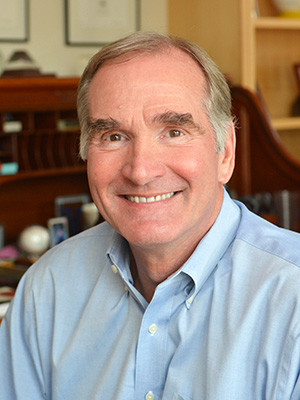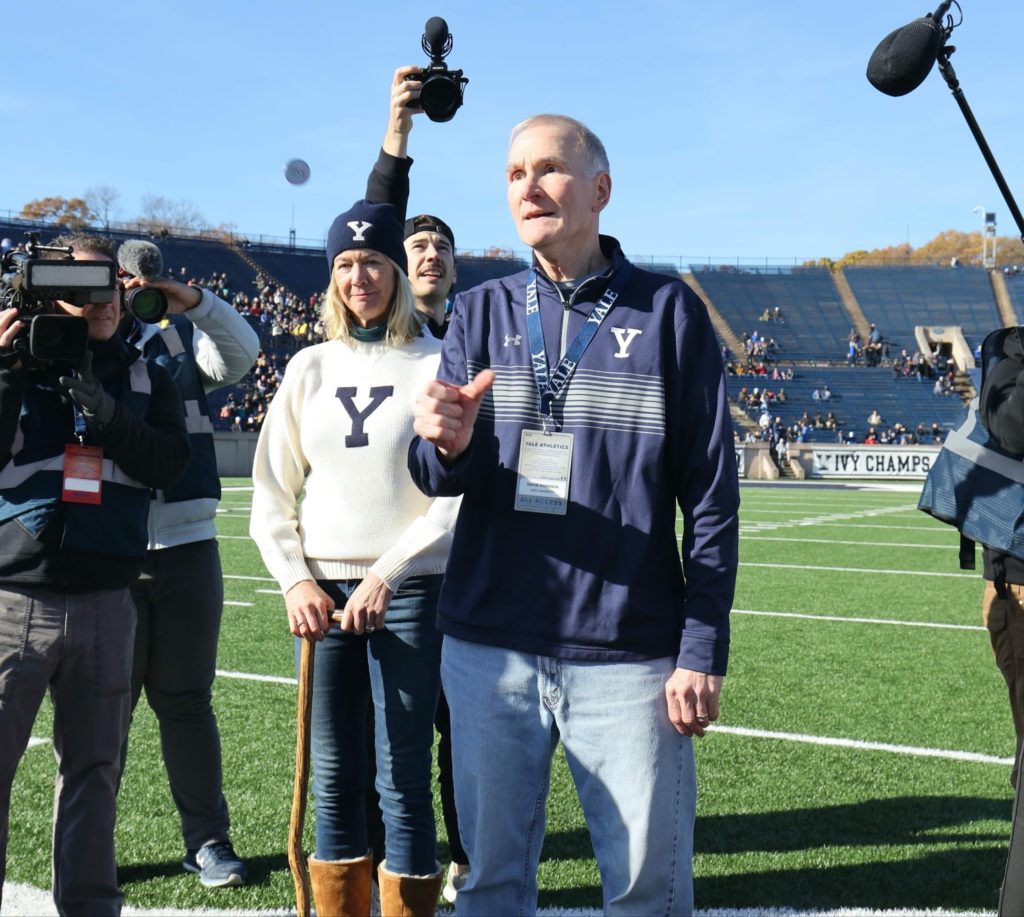
Yale News
David Swensen GRD ’80, Yale’s longtime Chief Investment Officer and creator of the “Yale Model” for institutional investing, died Wednesday evening.
In an email to the Yale community, University President Peter Salovey shared that Swensen had lost his nine-year-long battle with cancer. Swensen has led the Investments Office since 1985, overseeing the growth of Yale’s endowment from $1 billion to $31.2 billion. Throughout the past 30 years of Swensen’s leadership, Yale’s investments have generated returns of 12.4 percent per annum, unparalleled highs that established him as a “legend among institutional investors,” Salovey wrote. Friends and colleagues remembered Swensen as principled, generous and utterly devoted to Yale.
“David served our university with distinction,” Salovey wrote in the email. “He was an exceptional colleague, a dear friend, and a beloved mentor to many in our community. Future generations will benefit from his dedication, brilliance, and generosity.”

Swensen and colleague Dean Takahashi created the renowned “Yale Model” for investing, which emphasizes diversifying beyond stocks, bonds and other traditional investments and taking qualitative assessments of managers into account. The two met 45 years ago, when Swensen was Takahashi’s first-year counselor.
“He would rally us to gather for card games, intramurals, beer tastings, and just hanging out,” Takahashi said. “That passion for fun and building team culture continued on in his investment career.”
Former University President Richard Levin explained how Swensen’s work transformed Yale. As it grew under Swensen’s leadership, the endowment went from financing about one-tenth of Yale’s budget to one-third.
“Under his leadership, the superior performance of the Yale endowment made possible all that we have accomplished in the past thirty years: the rebuilding of the campus, the rejuvenation of downtown New Haven, the internationalization of our student body and academic programs, our commitment to making Yale College affordable for all who are admitted and our investments in world-class science and engineering,” Levin wrote in an email to the News.
Jeffrey Sonnenfeld, Professor of Leadership Practice at the School of Management, said that Swensen was a “treasured personal friend and a selfless friend of the University, a legend in higher education and finance, a generous benefactor, a responsible financial pioneer and innovator [and] a righteous defender of integrity in our financial markets.”
“He had the rare expertise and independence and equally rare courage needed to boldly call out the abuses of a small set of huge high frequency traders who’ve taken over public equity markets,” Sonnenfeld wrote in an email to the News.
In 2007 Swensen was awarded the Mory’s Cup for conspicuous service to Yale and in 2012 received the Yale Medal for outstanding individual service to the University. In 2014, he was presented with an honorary doctor of humane letters at Yale’s Commencement.
Judy Chevalier, Professor of Finance and Economics, recalled how she met Swensen at the copy machine of 451 College St. in 1986. She was an undergraduate, and he was newly-appointed to lead the Investments Office. He hired her to the office, where he let interns sit in on important meetings and took them out for lunch at Mory’s.
“He was extraordinarily generous with his time, even then,” she wrote in an email to the News. “The 1987 Dave Swensen Mory’s Lunch had some common features with the 2007 Dave Swensen lunch or the 2017 one a fascinating conversation at lunch, no hurry, and on the walk back, he always had something he had discovered about Yale that he wanted to show you a gargoyle, a plaque in the Corporation room, some detail on a facade.”
Edward Snyder, former Dean of the School of Management, said that Swensen’s work was essential to the school’s functioning.
“Whenever anyone points out that Yale SOM has a top two or three endowment on a per capita basis, the next statement should be one of gratitude to David Swensen,” Snyder told the News. “Is there anyone who has done more for Yale? No. Anyone in our community who is as impressive a person as David Swensen? Same answer.”
Swensen shared his knowledge with students, lecturing at Yale College and the School of Management. Swensen and Takahashi finished teaching their final course in Investment Analysis this week. They co-taught the seminar for the past 35 years.
In an email to the News, Salovey said that Swensen was a “consummate university citizen.” Swensen was the “leading investment manager in the world, and he still taught students every year,” Salovey added.
As a member of the President’s Economic Recovery Advisory Board, Swensen advised former President Barack Obama. He was a fellow of the American Academy of Arts and Sciences and a member of the Council on Foreign Relations. Swensen served as a trustee or adviser to numerous institutions, including the New York Stock Exchange, Brookings Institution and Cambridge University.
Swensen authored two books: “Pioneering Portfolio Management: An Unconventional Approach to Institutional Investment” and “Unconventional Success: A Fundamental Approach to Personal Investment”.
Swensen was particularly proud that he mentored investment officers to work with a mission focus, Takahashi said. Fifteen former members of the Office have gone on to run leading endowments or foundations and two-thirds of them are women, he added. Of the 15 top-ranked endowment based on performance over the past 10 years, six are managed by YIO alumni.
At a SOM event last year that showcased women endowment managers whom Swensen had mentored, he was asked how he wanted to be honored, Chevalier said. His reply: “‘Oh, I want to sit in the audience and learn!,’” she recalled.
This fall, he told the firms that manage the University’s money to hire more women and minorities or risk Yale pulling its money. He said the Investments Office would diversify its ranks as well.
Student activists have long advocated for Yale to divest from the fossil fuel industry. Since 2014, Yale’s Investment Office, under Swensen, has asked endowment managers to incorporate the costs of carbon emissions in their investment decisions, and to not work with companies that deny the cost of climate change or do not take economically sensible steps to reduce greenhouse gas emissions. Yale’s approach advantages investments with small greenhouse gas footprints, the YIO has stated.
Swensen was a committed fan of Yale Athletics. He always said that he had to pursue institutional investing because other institutions, like investment banks, do not have football and basketball games, Tina Lu, professor of East Asian Languages and Literatures, said.

“There were times when I would see him sitting courtside at a basketball game just looking like he was having the time of his life,” Lu said.
He hosted the annual “Swensen Tennis Extravaganza” at the Connecticut Open, raising millions of dollars for Yale’s community-based partnerships and would compete on the YIO softball team, Takahashi said.
He is survived by his wife, Meghan McMahon ’87, and three children.
Update, May 6 11:50 a.m.: This story has been updated to include a quote from Snyder and photos of Swensen at Yale sporting events.
Update, May 6 11:58 a.m.: This story has been updated to additional quotes from Salovey.
Update, May 6 12:31 p.m.: This story has been updated to include comments from Levin and Chevalier.
Update, May 6 8:23 p.m.: This story has been updated to include comments from more friends and coworkers.








